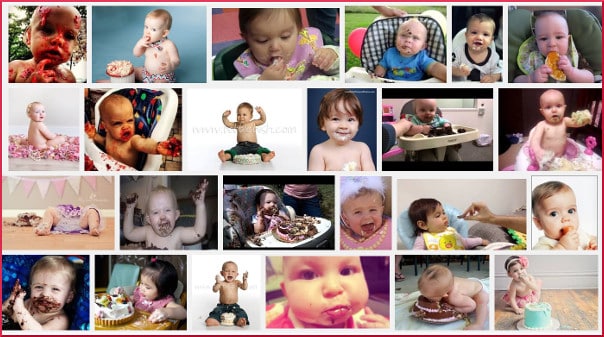A few years back, someone posted a video online that featured a toddler, still on the bottle and quite chubby, who smoked 40 cigarettes a day. It went viral, accumulating 27 million views and inspiring a huge number of disapproving comments as people strove to outdo each other in expressing their outrage.
Today, in a popular genre of YouTube clips, a baby in a high chair eats cake—most typically, an entire first birthday cake— and makes a big mess. The babies smear cake all over their hair, clothes, and immediate surroundings, and if the frosting is so garishly colored it seems to belong in a sealed hazardous waste drum, so much the better. They dive into the cake mouth-first, or stuff it in with both hands, while the adults on the sound track cheer them on.
Still photos are treasured too, and it might be said that the fashion for these graphics gives new meaning to the term “food porn.” Some of the videos attract millions of fans. (But then, the audience for zit-popping videos is also in the millions, so popularity should not be taken as an index of quality.) For a lot of these kids, it’s their first encounter with such a concentrated dose of sugar. They make funny faces, and the hilarity of the grownups knows no bounds.
A Cultural Obsession With Sugar
The images are deeply disturbing on many levels. Which kid will be the first to sue his parents for invasion of privacy, child exploitation, and a few other possible charges? Who will be the first to lose an election because her opponent dug up the old baby-meets-cake video? More importantly, with the knowledge we have now, these initiations could be seen as the moral equivalent of that cigarette-smoking toddler. In realistic, unsentimental terms, watching a baby go berserk over sugar is just about as cute as seeing a 10-year-old smoke crack for the first time. In other words, not very. But there is no worldwide gasp of outrage. Dr. Pretlow says:
Sugar addiction certainly is very real, and probably 2/3 of our country is addicted to sugar in one form or another. But it appears to be the sweet taste that is addictive (sensory addiction) rather than a direct effect of blood sugar on the brain. Else, that would imply that intravenously administered glucose is addictive, which it isn’t. Addicts don’t shoot up on glucose. Also, bulimics immediately purge the sweet food eaten, yet are still addicted. Thus, rising blood sugar from glycemic carbs, grains, etc. doesn’t seem to be addictive.
Few school-age kids eat cake all day, but an astonishing number switch their allegiance to soda and so-called energy drinks. Researchers have connected that habit with hyperactivity, ADHD, lousy report cards, difficult peer relationships, greater susceptibility to injuries, disruptive hormonal changes, increased cardiovascular disease risk, and a host of other poor outcomes in addition to obesity. Raw food advocate Lynn Griffith writes:
When discontinuing sugar from your child’s diet, your child may feel tired, light-headed, confused, experience shaking or weakness, tremors, headaches, depression, anger, nausea or even vomiting. These are all signs of sugar addiction and sugar withdrawal.
Just as babies don’t need to be persuaded to devour cake, older kids and adults need no encouragement to make sugar a staple of their diets. By and large, they do nothing to protest the current condition of things, as descried by Prof. Laura A. Schmidt of the University of California:
If you look at all packaged foods, 77 percent of them have sugar added to them. For example, it’s added to breads, it’s added to bagels, it’s added to ketchup, it’s added to salad dressing … Foods you think are quite savory tasting have sugar added to them. So it makes it very hard for the consumer to know when they’re getting too much sugar.
Sugar is the one thing nobody ever needs to worry about not getting enough of.
Your responses and feedback are welcome!
Source: “33 Babies Devouring Their First Birthday Cake,” Buzzfeed.com, 06/18/14
Source: “Sugar, caffeine, and energy drinks linked to poor behavior in middle school
children!,” TheRawFoodWorld.com, 02/14/15
Source: “Too much added sugar can do you in,”Today.com, 02/03/14
Image by Google Search


 FAQs and Media Requests:
FAQs and Media Requests: 












One Response